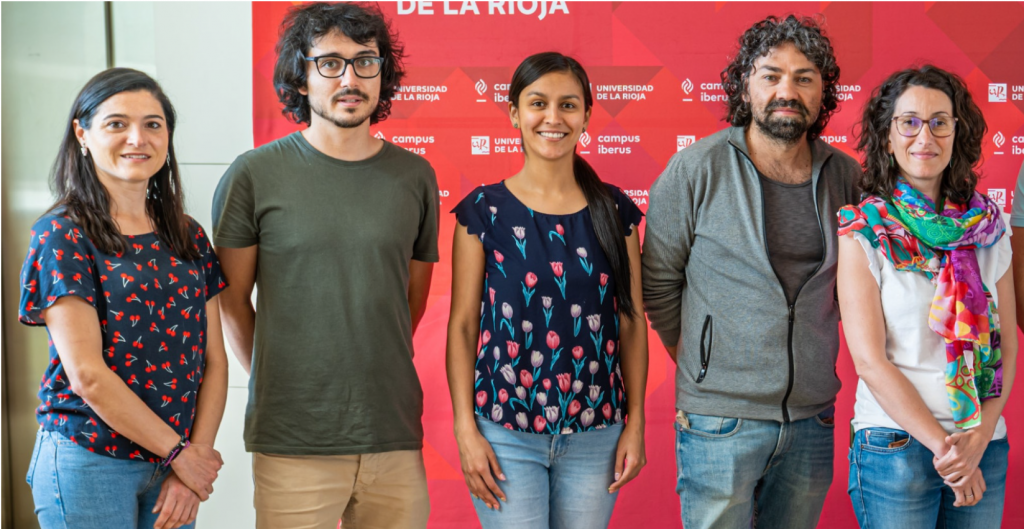Innovación agroecológica de la viña (IN-Vid)
Instituto de Ciencias de la Vid y del Vino (ICVV), Universidad de La Rioja
Dra. Raquel Campos-Herrera

From left to right.Mrs. Elisabet Vaquero, Lab Technician; Dr. Ignacio Vicente-Díez, Postdoctoral Researcher
Mrs. María del Mar González-Trujillo, PhD Student; Dr. Rubén Blanco-Pérez, Postdoctoral Collaborator;
Dr. Raquel Campos-Herrera, Principal Investigator
The In-Vid group (IN-Vid, http://www.icvv.es/invid) is an official research group of the CSIC (ref. 886222) with the long-term challenge of reducing the dependency on traditional agrochemicals in pest control, with a particular emphasis on vineyards, focusing on two specific challenges: (i) developing biocontrol tools, and (ii) understanding how agronomic management impacts agroecosystems to identify the most sustainable practices.
On one hand, we are seeking new non-chemical, low-environmental-impact alternatives for vine pest management based on the application of entomopathogenic nematodes or secondary metabolites produced by their symbiotic bacteria, which allow for new management tools for two critical arthropods in vineyards: Lobesia botrana and Philaenus spumarius (vector of Xylella fastidiosa); and the grapevine diseases: Botrytis cinerea and Plasmopara viticola.
On the other hand, promoting high functional biodiversity is critical to the sustainability of viticulture. Soil nematodes are an excellent model group for its evaluation since they form complex trophic networks, allowing for the estimation of maturity indices and the state of degradation of the agrosystem. However, this information is scarce and almost nonexistent when considering its relation to pest/pathogen control or crop improvements. In this context, In-Vid provides new indicators of management’s impact on beneficial vineyard fauna in several studies investigating, for example, the impact of cover crops or the effect of pest management (ecological versus integrated).
AFFILIATION
Instituto de Ciencias de la Vid y del Vino (ICVV)
Gobierno de La Rioja, CSIC
Universidad de La Rioja
Finca La Grajera Crta. Burgos Km. 6 Salida 13 Lo-20
26007, Logroño Spain
RELEVANT CONTRIBUTIONS AND PUBLICATIONS
- Campos-Herrera, R., González-Trujillo, M. del M., Vicente-Díez, I., Carpentero, E., Puelles, M., Vaquero, E., Cepulyte, R., 2023. Exploring entomopathogenic nematodes for the management of Lobesia botrana (Lepidoptera: Tortricidae) in vineyards: Fine-tuning of application, target area, and timing. Crop Prot. 174, 106392. https://doi.org/10.1016/j.cropro.2023.106392
- Vicente-Díez, I., Moreira, X., Pastor, V., Vilanova, M., Pou, A., Campos-Herrera, R., 2023. Control of post-harvest gray mold (Botrytis cinerea) on grape (Vitis vinifera) and tomato (Solanum lycopersicum) using volatile organic compounds produced by Xenorhabdus nematophila and Photorhabdus laumondii subsp. laumondii. BioControl 68, 549–563. https://doi.org/10.1007/s10526-023-10212-7
- Vicente-Díez, I., Carpentero, E., Pou, A., Campos-Herrera, R., 2023. Exploring bacterial cell-free supernatants, unfiltered ferments and crude bacteria uses of Xenorhabdus and Photorhabdus (Morganellaceae) for controlling Botrytis cinerea (Helotiales: Sclerotiniaceae). Biol. Control 183, 105259. https://doi.org/10.1016/j.biocontrol.2023.105259
- Vicente-Díez, I., Pou, A., Campos-Herrera, R., 2023. The deterrent ability of Xenorhabdus nematophila and Photorhabdus laumondii compounds as a potential novel tool for Lobesia botrana (Lepidoptera: Tortricidae) management. J. Invertebr. Pathol. 198, 107911. https://doi.org/10.1016/J.JIP.2023.107911
- Blanco-Pérez, R., Vicente-Díez, I., Pou, A., Pérez-Moreno, I., Marco-Mancebón, V.S., Campos-Herrera, R., 2022a. Organic mulching modulated native populations of entomopathogenic nematode in vineyard soils differently depending on its potential to control outgrowth of their natural enemies. J. Invertebr. Pathol. 192. https://doi.org/10.1016/j.jip.2022.107781
- Blanco-Pérez, R., Vicente-Díez, I., Ramos-Sáez de Ojer, J.L., Marco-Mancebón, V.S., Pérez-Moreno, I., Campos-Herrera, R., 2022b. Organic viticulture enhanced the activity of native entomopathogenic nematodes in DOCa Rioja soils (North of Spain). Agric. Ecosyst. Environ. 332, 107931. https://doi.org/10.1016/j.agee.2022.107931
- Vicente-Díez, I., Blanco-Pérez, R., González-Trujillo, M. del M., Pou, A., Campos-Herrera, R., 2021. Insecticidal effect of entomopathogenic nematodes and the cell-free supernatant from their symbiotic bacteria against Philaenus spumarius (Hemiptera: Aphrophoridae) nymphs. Insects 12, 448. https://doi.org/10.3390/insects12050448
